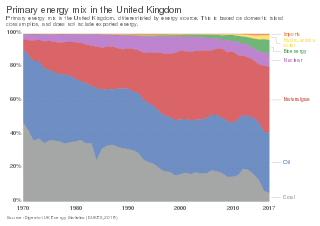
Scottish Power Limited, trading as ScottishPower, is a vertically integrated energy company based in Glasgow, Scotland. It is a subsidiary of Spanish utility firm Iberdrola.
The Renewables Obligation (RO) was designed to encourage generation of electricity from eligible renewable sources in the United Kingdom. It was introduced in April 2002, both in England and Wales and in Scotland albeit in a slightly different form: the Renewables Obligation (Scotland). The RO was later introduced in Northern Ireland in April 2005. In all cases, replacing the Non-Fossil Fuel Obligation which operated from 1990.
Centrica plc is a British multinational energy and services company with its headquarters in Windsor, Berkshire. Its principal activity is the supply of electricity and gas to consumers in the United Kingdom and Ireland.

The Office of Gas and Electricity Markets (Ofgem), supporting the Gas and Electricity Markets Authority, is the government regulator for the electricity and downstream natural gas markets in Great Britain. It was formed by the merger of the Office of Electricity Regulation (OFFER) and Office of Gas Supply (Ofgas).

Good Energy Group PLC is a British energy company based in Chippenham, Wiltshire that provides services in the electrification of transport and decentralised renewable energy generation such as domestic solar panels. The company is also an energy retailer, and built a portfolio of wind and solar generation which was sold in 2022. Founded by Juliet Davenport, its CEO is Nigel Pocklington.

The energy policy of the United Kingdom refers to the United Kingdom's efforts towards reducing energy intensity, reducing energy poverty, and maintaining energy supply reliability. The United Kingdom has had success in this, though energy intensity remains high. There is an ambitious goal to reduce carbon dioxide emissions in future years, but it is unclear whether the programmes in place are sufficient to achieve this objective. Regarding energy self-sufficiency, UK policy does not address this issue, other than to concede historic energy security is currently ceasing to exist.
E.ON UK is a British energy company and one of the largest suppliers of energy in the UK, following its acquisition of Npower. It is a subsidiary of E.ON of Germany and one of the Big Six energy suppliers. It was founded in 1989 as Powergen, and was listed on the London Stock Exchange and was once a constituent of the FTSE 100 Index. It has been a subsidiary of E.ON since 1 July 2002.

Npower Limited was a British supplier of gas and electricity to businesses. It has been a subsidiary of E.ON UK since January 2019. The company was formerly known as Innogy plc and was listed on the London Stock Exchange and was a constituent of the FTSE 100 Index.
Ecotricity is a British energy company based in Stroud, Gloucestershire, England, specialising in selling green energy to consumers that it primarily generates from its 87.2 megawatt wind power portfolio. It is built on the principle of heavily reinvesting its profit in building more of its own green energy generation.

Drax Group plc, trading as Drax, is a power generation business. The principal downstream enterprises are based in the UK and include Drax Power Limited, which runs the biomass fuelled Drax power station, near Selby in North Yorkshire. The Group also runs an international biomass supply chain business. The company is listed on the London Stock Exchange and is a constituent of the FTSE 250 Index.

The availability and uptake of green electricity in the United Kingdom has increased in the 21st century. There are a number of suppliers offering green electricity in the United Kingdom. In theory these types of tariffs help to lower carbon dioxide emissions by increasing consumer demand for green electricity and encouraging more renewable energy plant to be built. Since Ofgem's 2014 regulations there are now set criteria defining what can be classified as a green source product. As well as holding sufficient guarantee of origin certificates to cover the electricity sold to consumers, suppliers are also required to show additionality by contributing to wider environmental and low carbon funds.

OVO Energy is a major energy supplier based in Bristol, England.
Shell Energy Retail Limited was a British consumer gas, electricity and broadband provider. Formerly a subsidiary of Shell, the business was acquired by Octopus Energy in December 2023.

100Green, operating as Green Energy (UK) Ltd, is a British independent-energy company based in Ware, Hertfordshire. It was established in 2001 by CEO Douglas Stewart. The company provides Ofgem-certified renewable electricity and green gas to domestic and business customers throughout Great Britain. It is currently the only energy supplier in the UK to offer 100% green gas.
Co-op Energy is a membership-owned British energy supply company based in Warwick that began trading in 2010. It sells renewable electricity and gas to its ethically concerned member owner/customers and is an established large operator, an alternative to the Big Six energy suppliers. Constituting half or more of the Your Co-op Utilities division of its parent society Midcounties Co-operative, Co-op Energy is the only co-operative supplier in the British market, meaning supplied customers can voluntarily acquire an ownership share and thereby receive rights to influence the governance of the business, stand for election and have a say in formulating the products it offers.
The Big Six were the United Kingdom's largest retail suppliers of gas and electricity, who dominated the market following liberalisation in the late 1990s. By 2002, six companies – British Gas, EDF Energy, E.ON, RWE npower, Scottish Power and SSE – had emerged from the 15 former incumbent monopoly suppliers.

Solarplicity Energy Limited was a renewable energy company based in Hertfordshire, England. In August 2019 the company became the 13th energy supplier to collapse since 2018, affecting around 7,500 domestic and 500 business customers.

Bristol Energy was a municipally owned energy supply company, founded in September 2015 by Bristol City Council. Its business accounts were sold to Yü Energy in August 2020, and in the following month its residential accounts were sold to Together Energy. In October 2020, F&S Energy purchased Bristol Energy's renewable energy generator portfolio, along with its commercial feed-in tariff customers.

Bulb Energy Ltd., trading as Bulb, was an energy supply company in the United Kingdom acquired by Octopus Energy in 2022. Founded in 2013, the company attracted venture capital from DST Global and Magnetar Capital and ran at a financial loss while achieving rapid growth in customers. Bulb claimed to provide electricity and gas from renewable or off-set sources. As of November 2021, it had a share of approximately 5-6% of the UK energy market and was considered the seventh largest in the country.
Octopus Energy Group is a British renewable energy group. It was founded in 2015 with the backing of Octopus Group, a British asset management company. Headquartered in London, the company has operations in the United Kingdom, France, Germany, Italy, Spain, Australia, Japan, New Zealand and the United States. Octopus is the UK's largest supplier of electricity to domestic customers, and the second largest in domestic gas.












